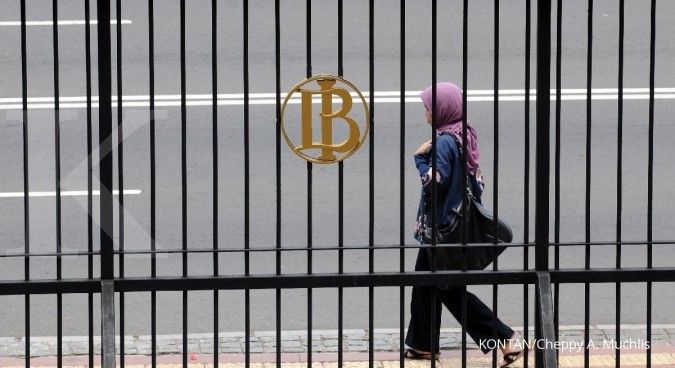Bank Indonesia (BI) and the government are confident that this year’s economic growth will be higher than the International Monetary Fund’s (IMF) projection, thanks to improvements in the third quarter of 2013. Finance Minister M. Chatib Basri said the IMF’s projection was too low given the current consensus of 5.5 percent to 5.9 percent growth of the gross domestic product (GDP). He also said the IMF’s projection was not consistent with the estimation of the current-account deficit, which stands at 3.4 percent of GDP in 2013. “Our current-account deficit is driven by high imports, which are mostly raw materials and capital goods. If imports remain high, investments will remain high. Economic growth cannot be that low if investments are still high,” Chatib said over the phone on Tuesday. The minister added that next year’s economy would improve on the back of better economic conditions in the United States and Japan. He was commenting on the World Economic Outlook, issued on Oct. 7, in which the IMF slashed its projection on Indonesia’s growth to 5.3 percent from 6.3 percent set in April. The organization said that Indonesia’s economy would improve in the following year, with GDP growth estimated to stand at 5.5 percent. However, the 2014 growth estimation was also lower than the IMF’s earlier projection of 6.4 percent in April. “Growth in Indonesia will slow due to sluggish investment and weaker commodity demand from other emerging market economies, as well as tighter financing conditions,” it said in the report. The IMF’s projection was lower than that of the World Bank (WB), which recently said that GDP would only expand 5.6 percent this year. The IMF also expects the global economy to expand 2.9 percent this year. It attributed the lower projection to uncertainty over US economic policies, as well as China’s slowing economy. BI Governor Agus Martowardojo said the country’s growth target was expected to revolve around 5.5 percent to 5.9 percent in 2013. Agus argued that government spending would also help the government achieve its growth target. Data from the Finance Ministry directorate general of treasury showed that as of September, the spending figure had amounted to Rp 1.09 quadrillion (US$94.7 billion), equal to 63.3 percent of the 2013 spending allocation, which was set at Rp 1.73 quadrillion. Meanwhile, BI announced on Tuesday that it would maintain its benchmark interest rate at 7.25 percent and would continue to monitor the global and national economy. Its lending and deposit facilities were also unchanged at 7.25 percent and 5.5 percent, respectively. “We will make sure that inflationary pressure remains under control,” Agus told a press conference. Gundy Cahyadi, an economist at Singapore-based DBS Bank, said that the central bank’s decision to hold the rates was no surprise as inflation had started to stabilize. Su Sian Lim, an ASEAN economist at the Singapore branch of the Hong Kong and Shanghai Banking Corporation (HSBC), wrote in her report that BI’s announcement was as expected, and that BI’s and the government’s policies—which had been implemented since June—were starting to have an impact. (Raras Cahyafitri)
Govt, central bank more optimistic than IMF
Bank Indonesia (BI) and the government are confident that this year’s economic growth will be higher than the International Monetary Fund’s (IMF) projection, thanks to improvements in the third quarter of 2013. Finance Minister M. Chatib Basri said the IMF’s projection was too low given the current consensus of 5.5 percent to 5.9 percent growth of the gross domestic product (GDP). He also said the IMF’s projection was not consistent with the estimation of the current-account deficit, which stands at 3.4 percent of GDP in 2013. “Our current-account deficit is driven by high imports, which are mostly raw materials and capital goods. If imports remain high, investments will remain high. Economic growth cannot be that low if investments are still high,” Chatib said over the phone on Tuesday. The minister added that next year’s economy would improve on the back of better economic conditions in the United States and Japan. He was commenting on the World Economic Outlook, issued on Oct. 7, in which the IMF slashed its projection on Indonesia’s growth to 5.3 percent from 6.3 percent set in April. The organization said that Indonesia’s economy would improve in the following year, with GDP growth estimated to stand at 5.5 percent. However, the 2014 growth estimation was also lower than the IMF’s earlier projection of 6.4 percent in April. “Growth in Indonesia will slow due to sluggish investment and weaker commodity demand from other emerging market economies, as well as tighter financing conditions,” it said in the report. The IMF’s projection was lower than that of the World Bank (WB), which recently said that GDP would only expand 5.6 percent this year. The IMF also expects the global economy to expand 2.9 percent this year. It attributed the lower projection to uncertainty over US economic policies, as well as China’s slowing economy. BI Governor Agus Martowardojo said the country’s growth target was expected to revolve around 5.5 percent to 5.9 percent in 2013. Agus argued that government spending would also help the government achieve its growth target. Data from the Finance Ministry directorate general of treasury showed that as of September, the spending figure had amounted to Rp 1.09 quadrillion (US$94.7 billion), equal to 63.3 percent of the 2013 spending allocation, which was set at Rp 1.73 quadrillion. Meanwhile, BI announced on Tuesday that it would maintain its benchmark interest rate at 7.25 percent and would continue to monitor the global and national economy. Its lending and deposit facilities were also unchanged at 7.25 percent and 5.5 percent, respectively. “We will make sure that inflationary pressure remains under control,” Agus told a press conference. Gundy Cahyadi, an economist at Singapore-based DBS Bank, said that the central bank’s decision to hold the rates was no surprise as inflation had started to stabilize. Su Sian Lim, an ASEAN economist at the Singapore branch of the Hong Kong and Shanghai Banking Corporation (HSBC), wrote in her report that BI’s announcement was as expected, and that BI’s and the government’s policies—which had been implemented since June—were starting to have an impact. (Raras Cahyafitri)





